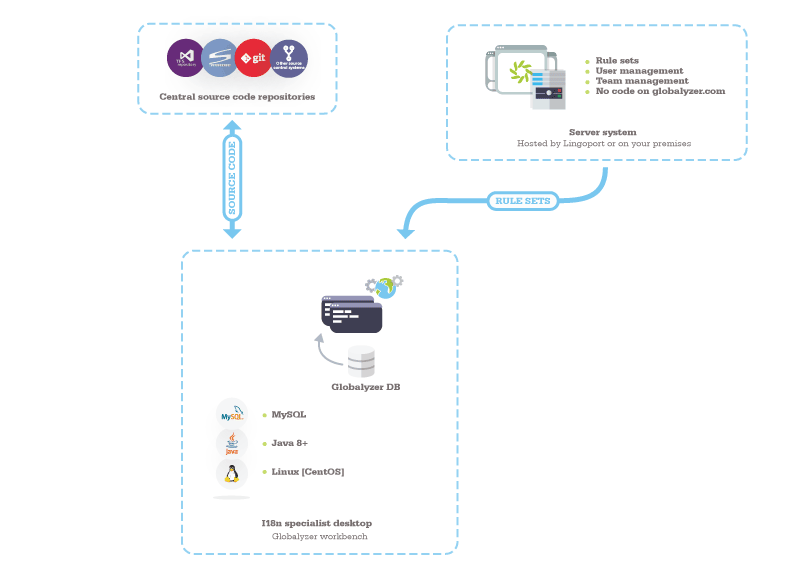Difference between revisions of "Globalyzer Workbench for i18n Specialists"
m (Masnes moved page Globalyzer Workbench of i18n Specialists to Globalyzer Workbench for i18n Specialists: of -> for) |
(→Introduction) |
||
| (27 intermediate revisions by the same user not shown) | |||
| Line 1: | Line 1: | ||
= Introduction = |
= Introduction = |
||
| − | The Globalyzer Workbench is power application for i18n specialists. It allows users to create Globalyzer projects, test out rule |
+ | The [[Terms_and_Definitions#GlobalyzerWorkbench|Globalyzer Workbench]] is power application for [[Terms_and_Definitions#i18n|i18n]] specialists. It allows users to create [[Terms_and_Definitions#Globalyzerproject|Globalyzer projects]], test out [[Terms_and_Definitions#ruleset|rule set]][[Terms_and_Definitions#scan|scans]] and tune them. Finally, users can analyze the resulting candidate issues by going to the line in the source which may be modified. [[Terms_and_Definitions#embeddedString|Embedded strings]] can be externalized en mass to resources files. |
= Target User= |
= Target User= |
||
| − | The typical Globalyzer Workbench user is knowledgeable in internationalization, understands the power of the Lingoport |
+ | The typical [[Terms_and_Definitions#GlobalyzerWorkbench|Globalyzer Workbench]] user is knowledgeable in [[Terms_and_Definitions#internationalization|internationalization]], understands the power of the [[Terms_and_Definitions#LingoportSuite|Lingoport Suite]], and can create and tune [[Terms_and_Definitions#ruleset|rule sets]] for members of the development staff. |
| + | |||
= Typical Deployment = |
= Typical Deployment = |
||
| + | The [[Terms_and_Definitions#GlobalyzerWorkbench|Globalyzer Workbench]] resides on a local desktop. The user can access the [[Terms_and_Definitions#GlobalyzerServer|Globalyzer Server]] to use, create and modify [[Terms_and_Definitions#ruleset|rule sets]]. |
||
| − | The Workbench resides on a local desktop. |
||
[[File:Workbench for I18n Specialists.gif]] |
[[File:Workbench for I18n Specialists.gif]] |
||
= Typical Workflow= |
= Typical Workflow= |
||
| − | The i18n specialist uses the Workbench to: |
+ | The [[Terms_and_Definitions#i18n|i18n]] specialist uses the [[Terms_and_Definitions#GlobalyzerWorkbench|Globalyzer Workbench]] to: |
* Get the code from a source code repository, |
* Get the code from a source code repository, |
||
| − | * Create a project from within the Workbench connected to a Globalyzer |
+ | * Create a [[Terms_and_Definitions#Globalyzerproject|Globalyzer project]] from within the [[Terms_and_Definitions#GlobalyzerWorkbench|Globalyzer Workbench]] connected to a [[Terms_and_Definitions#GlobalyzerServer|Globalyzer Server]] |
* Manage the candidate issues |
* Manage the candidate issues |
||
| − | * Tune the rule sets |
+ | * Tune the [[Terms_and_Definitions#ruleset|rule sets]] |
* Refactor the code |
* Refactor the code |
||
* Push that code to the repository. |
* Push that code to the repository. |
||
| − | When the rule sets are deemed acceptable, the Workbench user may save the Globalyzer project configuration by exporting it to a file, <code>project.gproj</code>. They may then push the <code>project.gproj</code> to the repository for use by other Workbench users and/or a continuous globalization system. |
+ | When the rule sets are deemed acceptable, the [[Terms_and_Definitions#Workbench|Workbench]] user may save the [[Terms_and_Definitions#Globalyzerproject|Globalyzer project]] configuration by exporting it to a file, <code>project.gproj</code>. They may then push the <code>project.gproj</code> to the [[Terms_and_Definitions#repository|repository]] for use by other [[Terms_and_Definitions#Workbench|Workbench]] users and/or a continuous globalization system. |
| + | |||
| + | = Installation Components = |
||
| + | * The '''Globalyzer Server''' (Server system) is hosted by Lingoport. If the Globalyzer Server is on site, the customer will have to provide a Linux system and install the Globalyzer Server software. |
||
| + | * The '''Developer Machine''' (I18n specialist desktop) is used by an [[Terms_and_Definitions#internationalization|internationalization]] specialist who will use the Globalyzer clients (probably Workbench and Globalyzer Lite) to analyze code. |
||
| + | * Although not shown in the picture, the '''Dashboard System''' could be installed on a Linux system to illustrate progress with issues. |
||
= Installation Notes = |
= Installation Notes = |
||
| − | To install the Workbench, login to the Globalyzer |
+ | To install the [[Terms_and_Definitions#Workbench|Workbench]], login to the [[Terms_and_Definitions#GlobalyzerServer|Globalyzer Server]], download the Globalyzer Client installer for the platform you are running on, and run the installer. |
Latest revision as of 17:26, 30 May 2017
Contents
Introduction
The Globalyzer Workbench is power application for i18n specialists. It allows users to create Globalyzer projects, test out rule setscans and tune them. Finally, users can analyze the resulting candidate issues by going to the line in the source which may be modified. Embedded strings can be externalized en mass to resources files.
Target User
The typical Globalyzer Workbench user is knowledgeable in internationalization, understands the power of the Lingoport Suite, and can create and tune rule sets for members of the development staff.
Typical Deployment
The Globalyzer Workbench resides on a local desktop. The user can access the Globalyzer Server to use, create and modify rule sets.
Typical Workflow
The i18n specialist uses the Globalyzer Workbench to:
- Get the code from a source code repository,
- Create a Globalyzer project from within the Globalyzer Workbench connected to a Globalyzer Server
- Manage the candidate issues
- Tune the rule sets
- Refactor the code
- Push that code to the repository.
When the rule sets are deemed acceptable, the Workbench user may save the Globalyzer project configuration by exporting it to a file, project.gproj. They may then push the project.gproj to the repository for use by other Workbench users and/or a continuous globalization system.
Installation Components
- The Globalyzer Server (Server system) is hosted by Lingoport. If the Globalyzer Server is on site, the customer will have to provide a Linux system and install the Globalyzer Server software.
- The Developer Machine (I18n specialist desktop) is used by an internationalization specialist who will use the Globalyzer clients (probably Workbench and Globalyzer Lite) to analyze code.
- Although not shown in the picture, the Dashboard System could be installed on a Linux system to illustrate progress with issues.
Installation Notes
To install the Workbench, login to the Globalyzer Server, download the Globalyzer Client installer for the platform you are running on, and run the installer.
